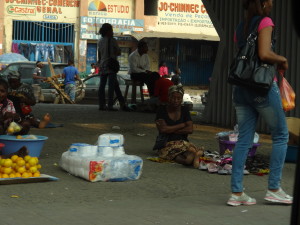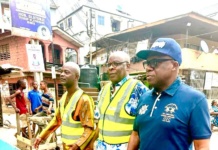A human rights watchdog has said police in Angola are abusing impoverished street vendors in the capital Luanda.
Officers are accused of attacking and demanding bribes of street sellers before moving them from their spots. Human Rights Watch officials said this is a symptom of wider repression in the oil-rich southern African nation.
For the last year, authorities in Angola’s capital have taken a so-called “clean-up” operation to what rights groups say is an abusive level — harassing, attacking and brutalising the poorest of the poor in southern Africa’s biggest oil producer.
That operation has impacted a group that has very little say in how things are run in Angola: street vendors who peddle their wares and are too poor to afford permanent structures.
Leslie Lefkow, deputy director of Human Rights Watch’s Africa division, said the clean-up itself isn’t the problem — it’s the way it’s being done. “Many of these street vendors are women and girls. They are among Angola’s poorest people, they are selling bags of water, or cookies, or roasted corn, or peanuts, things like this, making very little income — dollars a day. And the street vendors are living in fear because the police are mounting almost daily operations. They descend on these street markets and beat everyone in sight, including pregnant women,” he said.
The governor of Luanda announced the initiative in October 2012. Officials said the move would reduce the informal sector in a nation still struggling to piece itself together after a 27-year-long civil war that ended in 2002. Authorities at the time promised to build new markets for the vendors, though those have yet to appear.
Lefkow said that there are other hurdles that the government seems unwilling to address. “The problem is, is that there are a number of obstacles for these people who are in the informal sector to actually work formally in markets. Even if they have the money to pay fees to get a licence, for example, many of them don’t even have identity documents,” he noted. “They’ve been living around Luanda for many years. Many of them fled the civil war in Angola and came from other areas. And the government has done virtually nothing to help these people get identity documents, which are key for them to be able to work and live legally and enjoy the benefits of working in the formal sector.”
Despite the nation’s vast oil wealth, many Angolans remain desperately poor. The World Bank said the average life expectancy is just 51 years, and UNICEF said more than half the population lives below the poverty level – set at $1.25 per day.










